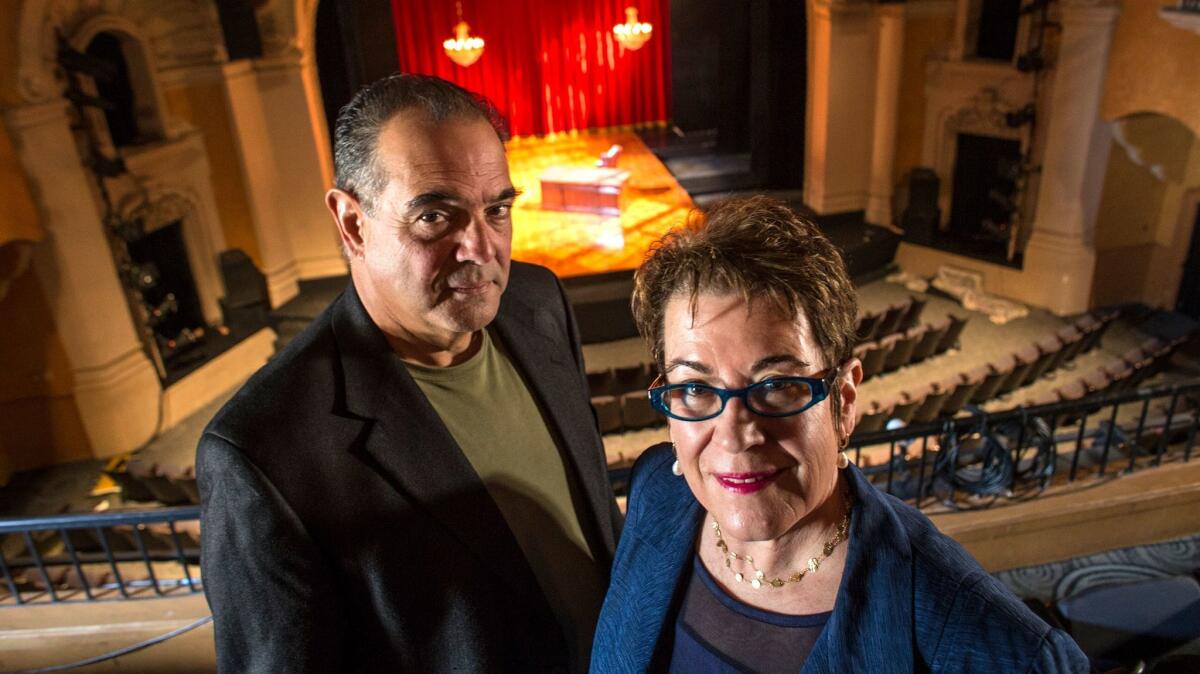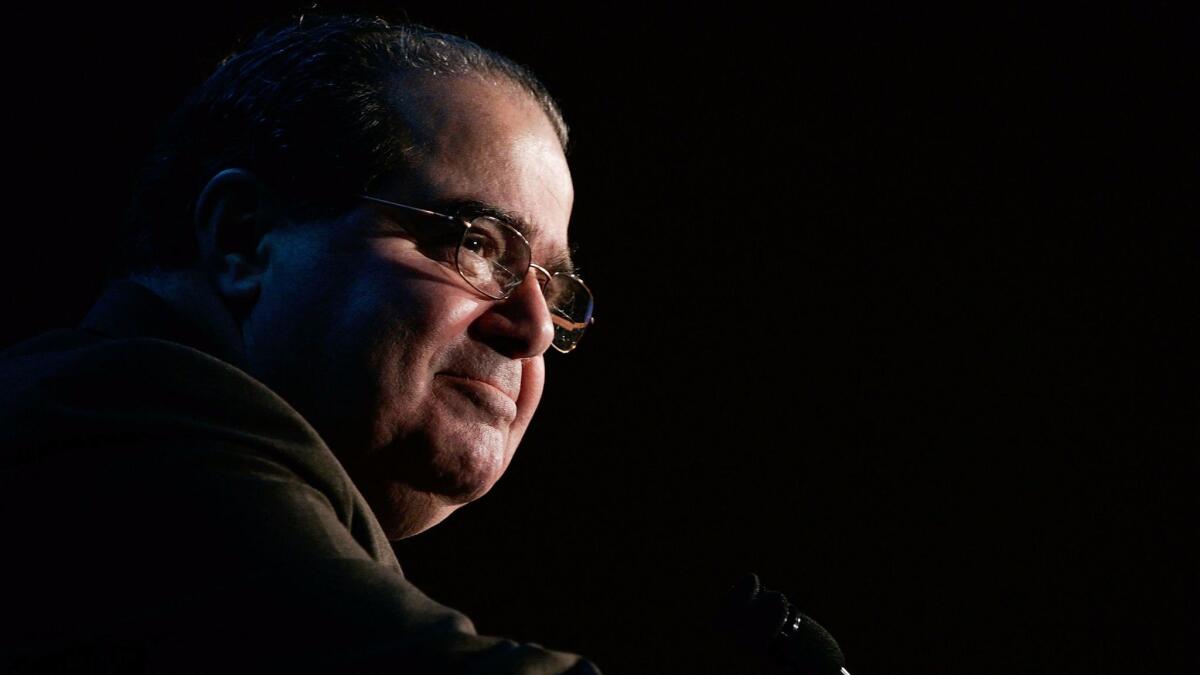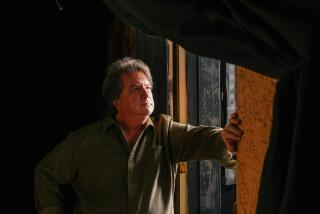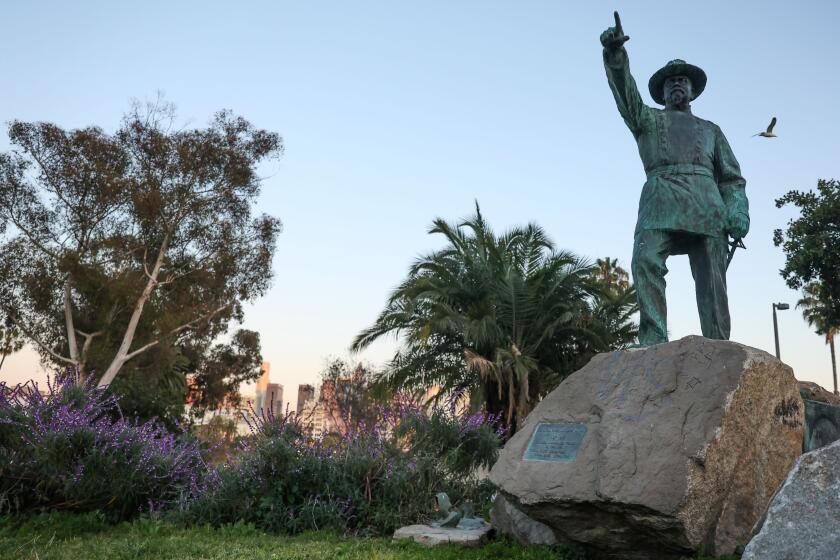What a play about Antonin Scalia tells us about this moment in American history

Pugnacious in robes, rigorous in intellect, the judge liberals feared cracked jokes and loved opera. But mostly he was a combative writer whose strict interpretation of the Constitution on gay rights, gun control and other polarizing issues galvanized conservatives and sharpened the acrimony in American politics.
The late Supreme Court Justice Antonin Scalia relished ideological battles and was a master of dissent. He quoted Shakespeare, cited Homer and was a relentless enemy of civil libertarians. His right-leaning imprimatur on the court and the nation’s consciousness remained potent more than a year after his death during last week’s Senate showdown to name Judge Neil M. Gorsuch as his successor.
Scalia’s brash spirit and irascible charm will be center stage Thursday when Pasadena Playhouse opens its production of “The Originalist,” a play by John Strand that examines the meaning of the 230-year-old Constitution. Is it a fluid, living document malleable to the times? Or is it, as Scalia saw it, a fixed set of principles that should be interpreted according to the Founding Fathers’ original intent.
“I don’t think I’ve ever seen the country more interested in the Supreme Court,” said Molly Smith, the play’s director and the artistic director of Arena Stage in Washington, D.C. “Our political systems are broken. Congress is broken. The presidency is broken. … America has been asleep, complacent about our democracy. But I think people are now awake in a way I can’t remember in my entire life. They are diving in.”
“The Originalist” is a meditation on Scalia’s judicial philosophy as he intellectually spars with Cat, his liberal law clerk. Their exchanges — cutting, fierce and comical — speak to the nation’s rancor in an era when even the Supreme Court has been tainted by allegations of partisan politics. The passions and divisiveness in the play reveal how far the country has drifted from the political center; compromise has collapsed amid screeds, tweets and intransigence.
Donald Trump’s election has revealed not only political but deep cultural chasms, as if two lands are bristling beneath the same flag. For many, what America stands for, its ethos and its spirit, are under siege, much like the tumult during the Great Depression and the protest marches and counter-culture zeitgeist of the 1960s. These days, our iPhones and flashing screens deliver less reconciliation and resonance than nano-second reminders of fitful things we cannot calm and news that at once numbs and enrages us.
Such unrest in a nation’s soul has inspired playwrights since Sophocles. Recent American politics, rich with shades of farce and tragedy, has led to revivals and original plays that reflect where we have landed. Pulitzer Prize winner Robert Schenkkan’s new play “Building the Wall,” about Trump’s nationalist rhetoric and immigration policies, is playing at the Fountain Theatre in Los Angeles. Over the next decade, Smith’s Arena Stage plans to commission 25 plays that examine power, political sentiments and public figures central to American history.
Lawrence Wright’s “Camp David,” directed by Smith in its 2014 world premier at the Arena, addressed the peace deal President Carter negotiated between Egyptian President Anwar Sadat and Israeli Prime Minister Menachem Begin. Schenkkan’s play “All the Way,” about President Johnson’s wheedling and blackmailing to pass civil rights legislation, won the Tony Award in 2014. Both plays, like “The Originalist,” focus on colorful personalities and competing ideas that have shaped landmark moments.
The human consequences of political and economic forces, many of which propelled Trump’s victory, have also been laid bare in the theater. Stephen Karam’s “The Humans” glimpses the anxieties and uncertainties of the middle class, and Lynn Nottage’s “Sweat,” set in a blue-collar tavern in Reading, Pa., won the Pulitzer Prize this week for what the jury called “a nuanced yet powerful drama that reminds audiences of the stacked deck still facing workers searching for the American dream.”
“A decade ago, I couldn’t get writers to think about writing politically. Playwrights now want to write about politics,” said Smith. “Writers before were interested in the breakdown of the family. Issues of sexuality, issues of race, which are political as well. There’s a desire now to get to something larger that is not just about the person.”
Played by Edward Gero, a Shakespearean actor who originated the role at the Arena in 2015, Scalia is a bon vivant or an enfant terrible of the right, a wiseacre with a quick wit who shoots guns, writes stinging dissents and enters the play to Verdi’s “La Traviata.” Gero spent time with Scalia before the justice’s death and discovered that the families of both men came from Sicilian towns about four miles apart.

“I think we’re going back to the roots of what theater is about. We have the responsibility to raise these ideas. To speak directly to those in power.”
— Edward Gero, actor
“‘Well, you know, you kind of look like me,’” Gero recalled Scalia telling him. “‘But you don’t have the Scalia uni-brow.’ I told him, ‘I pluck.’ ” Gero added: “Scalia knew how to land a line, get a laugh. He had an aura. He knew how to command a room, much like an actor. His fluency of language was amazing. His legacy is how to think about the law, how to write about it. ...That has had a profound impact on this court.”
The play delves briskly and with insight into legal complexities, including from Scalia’s court opinions, but at times passages can read like templates for liberal and conservative thought. Scalia and Cat (Jade Wheeler) ruminate and bicker over issues that have defined politics and laws for generations: same-sex marriage, gun rights, abortion, affirmative action, executive privilege and religion. Scalia’s Catholic faith — he had nine children — often seems indivisible from his judicial philosophy. He was revered by the right and reviled by the left, which regarded him as a dangerous throwback to the early “Mad Men” era.
In an early scene, Cat tells the justice: “You are probably the most polarizing figure in American civic life.”
But the back and forth between the two is reminiscent of the snappy dialogue in Spencer Tracy and Katharine Hepburn films.
Scalia: “Just how liberal are you, anyway?”
Cat: “Sir, I fall into the ‘flaming’ category.”
Scalia: “Flaming. Probably every liberal’s fate in the afterlife.”
Cat: “Eternal hellfire?”
Scalia: “God’s punishment for stubbornly refusing to see things as they are.”
Strand has done a “wonderful job as a playwright of giving us the passion, the grist but also the entertainment that takes us fully into the story,” said Smith, who has directed more than 30 plays at the Arena Stage and made her Broadway debut in 2014 with “The Velocity of Autumn.” “There’s an impact that happens to the audience as well. They’re completely engaged in the story and with the fight that happens on stage and ... being able to go into the secret world of the court.”
When the play opened at the Arena, President Obama’s term was winding down and the nation’s capital was bitter and divisive but few imagined the rise of Trump. Many who attended the performances worked in or were steeped in American politics; a number of them personally knew Scalia. Gero said “The Originalist” challenged the establishment in a way that it and other plays are exploring the country’s consciousness.
“The play asks the question is consensus possible anymore?” Gero said. “I think we’re going back to the roots of what theater is about. We have the responsibility to raise these ideas. To speak directly to those in power.”
♦ ♦ ♦ ♦ ♦ ♦ ♦ ♦ ♦ ♦
‘The Originalist’
Where: Pasadena Playhouse, 39 S. El Molino Ave.
When: In previews through Wednesday, opens Thursday. Performances 8 p.m. Tuesdays-Fridays, 4 and 8 p.m. Saturdays, 2 p.m. Sundays (check for exceptions); ends May 7
Tickets: $25-$115 (subject to change)
Information: (626) 356-7529, PasadenaPlayhouse.org
See the most-read stories this hour »
Twitter: @JeffreyLAT
ALSO:
Realism or cliche? Hollywood struggles to get the working class right
Acting teacher Elizabeth Mestnik wants to know what you would die for, and please no phony tears
More to Read
The biggest entertainment stories
Get our big stories about Hollywood, film, television, music, arts, culture and more right in your inbox as soon as they publish.
You may occasionally receive promotional content from the Los Angeles Times.







